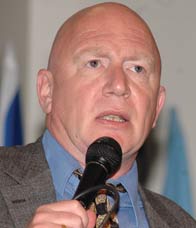|
Interview with Carlo Strenger on Midlife Crisis
February 2009 - By Dr. Nagendra V Chowdary
 Carlo Strenger
Carlo StrengerCarlo Strenger, Associate Professor at the psychology department of Tel Aviv University, a member of the institute of Existential Psychoanalysis, Zurich and of the Permanent Monitoring Panel on Terrorism of the World Federation of Scientist. 
One of the problems of midlifers who
have worked in corporations all their
careers is that they are frightened of
branching out on their own. They feel
that they don’t have what it takes.
This is why it is very important to
talk to others who can help us to realize
what our assets are, and what we
have to offer to the open market. I
know this may sound unrealistic, but
I have never seen an executive who,
sometimes with some help, didn’t
find out that he or she had assets that
could be used outside the corporate
world. Apart fromthe age (43-62), are there
any other signals that indicate that
someone is getting into a midlife situation?
|
|
What immediate and long term
precautions do you suggest for someone
to view midlife change not as a
crisis but rather as an opportunity?
The major indicator is a feeling of
meaninglessness, joylessness and
tiredness. This is the indicator that
it’s time to move on. The way to
change perception of change fromcrisis
to opportunity is to realize that
this is our most important chance to
truly become who we can be; to realize
potentials that have not received
enough expression so far. There are
so many people who feel that only in
their second lifecycles they have fully
become themselves! We see them every
day through our coaches and clients
at Life-Take2 Institute, and we
see people in their fifties, sixties, and
sometimes seventies who acquire a
new sense of purpose. Once again: midlife change is an existential
necessity, because as humans
we need to grow and evolve to the
day of our death. Midlife is our greatest
opportunity to generate new
meaning, and it is a pity not to make
full use of this period in life. Many executives definitely feel a
vacuum in their midlife. For all such
people, is there any way to preempt
such a crisis? Is it worth preempting?
This is a very important point: it is
almost impossible to completely preempt
such a crisis.What we can do is not deny it, and to start as soon as
possible thinking deeply about potential
change. We also need to realize
that the crisis is not just a bad thing; it
is an opportunity for renewal and the
generation of new meaning! Is national culture and the economic
state of a country, anything to
do with the way someone treats his/
her midlife change?
Themore collectivist the national culture
is, the more difficult change is.
France and Germany for example
were used to very stable employment
systems and people grew up with the
idea of cradle to grave security, as they
also did in Japan. Hence executives in
these countries find it more difficult
to think of a second lifecycle that will
be very different from the first. In the US there are other problems;
since most executives depend on
their jobs for health-insurance, they
feel that it is dangerous to leave their
jobs. At this point I would say that
almost every country has its share of
problems, since thinking in two
lifecycles has not yet become part of
global culture. I believe that the upside
of the current financial crisis is
that it will lead all countries and cultures
to rethink their conception of
development across the lifespan, because
all pension systems are in crisis. This being said, I do not have enough
insight into contemporary Indian culture,
and I would love the readers of
this interview to share their experience
with me and to enlighten me
about the structure of the problem in
India! In most of the business schools
across the globe, there is a ‘cursory’
course on organizational behavior.
You being a psychology practitioner,
do you advocate psychology being
made mandatory for all the MBA students?
What difference will it make
for a prospective manager/executive?
I do believe that psychology is very
useful for anybody who deals with
human beings. But I would like to put
the emphasis on the personal gain of
acquiring the psychological tools for
self-reflection. Training in self-reflection
is a tool that is of the essence to
all of us if we want to be and become
the person that we can be and to fully
realize our potential and what we
have to give to the world. India has a
very long tradition of fostering such
tools, and I think it will be fascinating
to see how they can be connected to
psychological conceptions that have
evolved in the West, and I look forward
to the opportunity for fruitful
exchanges on this topic.
1.
Walt Disney's Corporate Governance Crisis Case Study
2. ICMR
Case Collection
3.
Case Study Volumes
|
The interview was conducted by Dr. Nagendra V Chowdary, Consulting Editor,
Effective Executive and Dean, IBSCDC,
Hyderabad. This interview was originally published in Effective Executive, IUP, February 2009. Copyright © February 2009, IBSCDC
No part of this publication may be copied, reproduced or distributed, stored in a
retrieval system, used in a spreadsheet, or transmitted in any form or medium –
electronic, mechanical, photocopying, recording, or otherwise – without the permission
of IBSCDC. |
